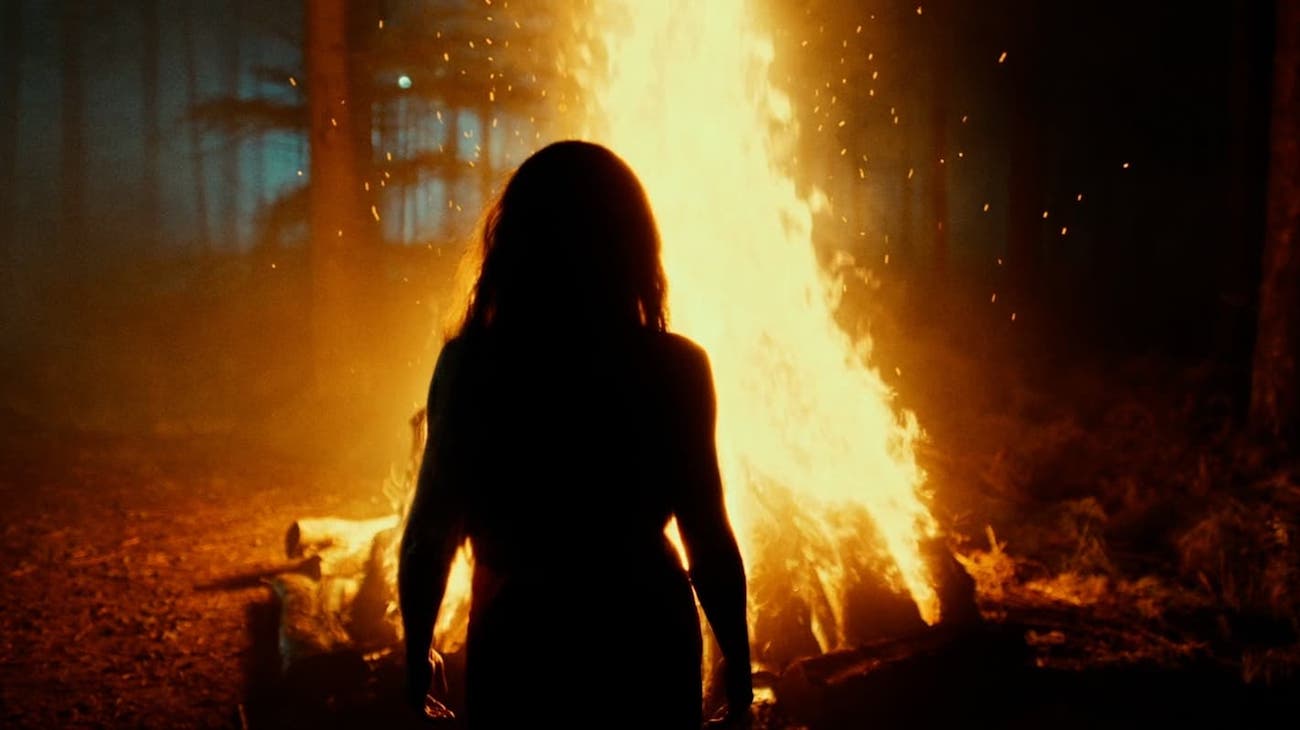
Recent years have seen an impassioned debate about the merits of what some call elevated horror. By “elevated,” these folks generally mean exhibiting any sort of ambition beyond scaring the bejeezus out of viewers; this can range from being snail-paced and lugubrious (with intermittent grotesque shocks), à la Ari Aster’s Hereditary and Midsommar, to simply having a readily identifiable theme, as do The Babadook and Get Out. Such films have existed since the dawn of cinema—hell, every screen Frankenstein, going back to 1910, was adapted from a novel subtitled The Modern Prometheus—and I’m firmly allied, in principle, with the camp rolling its eyes hard at complaints that amount to “Just give us the gore, egghead!” At the same time, however, my vexation has of late enlarged (let’s throw in some elevated language, eh?) with movies that employ horror iconography exclusively in the service of illustrating and righteously condemning horrific behavior. It’s a laudable impulse that too often makes for a drearily didactic experience, producing anxiety only in those who might identify with the inevitably all-too-human villain.
The latest casualty of this disinclination is She Will, the feature directorial debut of one Charlotte Colbert. This is a film that’s not just self-conscious about its strategic use of familiar genre tropes, but openly so: Early on, as Veronica Ghent (Alice Krige) and her personal nurse/assistant, Desi (Kota Eberhardt), arrive at a retreat located deep in the Scottish woods, Ms. Ghent points out that their circumstances resemble the beginning of a horror movie: “The young ingénue—you—is brought somewhere remote to be sacrificed in an horrendous way, to feed an aging community that refuses to die.” That’s not quite how She Will unfolds, of course, but it’s a signal that we’re meant to analyze what follows, perhaps contrasting it with such predecessors. In particular, one can’t help but notice, rather speedily, that Desi the ingénue is not this film’s vulnerable protagonist. Instead, the focus is squarely on Veronica, a former child actor, now in her sixties, who’s just had a double mastectomy and seeks peace and quiet while she recuperates. Alas, what she thought was a solo retreat turns out to be a group affair, packed with pretentious artsy types (devotees of elevated horror, no doubt) and hosted by an especially touchy-feely guru played by Rupert Everett.
It's symptomatic of She Will’s fundamental problem that the film could jettison its supporting cast without altering its trajectory in any significant way. Veronica and Desi don’t even stay in the same building as everyone else—they’re housed in a separate cottage some distance away, in order to maximize the feeling of spooky isolation. Scenes involving the others (none of whom, apart from Everett’s leader, makes much of an impression) function like a mediocre LP’s filler tracks, just getting it to the proper length. Everything of importance involves Veronica reckoning with her traumatic past, which saw her star, at the tender age of 13, in a controversial movie called Navajo Frontier, directed by a celebrated auteur named Eric Hathbourne (Malcolm McDowell). It’s very heavily implied that Hathbourne, who’s now planning to helm a remake, in some way abused the teenage Veronica; he refers to her, in a spectacularly creepy tone, as “my special girl,” and insists to an interviewer, when pressed about Navajo Frontier’s never-specified controversy, that 1969 was “a completely different era.” Veronica’s emotional arc sees her move from shame to more productive emotions, symbolized by her ditching the false breasts she’d been wearing and regarding her scars in the mirror. At the same time, she gradually warms toward Desi, no longer perceiving her youth and beauty as a threat.
You may have noticed that there’s not much horror to speak of in that description, save for the horror of presumed sexual assault that occurred decades before the movie began. Colbert and co-screenwriter Kitty Percy could have chosen to make a straightforward drama about this heady subject—one that might have dismantled the (onscreen) director’s delusional self-justifications while acknowledging the (fictional) actor’s conflicted feelings about that time in her life. (For a more benign but still harrowing example of that dynamic—which may well have partially inspired this movie, for all I know—see Sarah Polley’s essay about performing in Terry Gilliam’s The Adventures of Baron Munchausen as a little girl.) Instead, they fashioned a superficial chiller that inelegantly weds Veronica’s trauma with the fate of Scottish women burned at the stake as witches centuries earlier, by way of some clunky exposition informing us that their ashes enrich the estate’s soil and infilitrate, in the form of peat, its water supply. Most of She Will’s horror imagery consists of Veronica wandering the woods alone at night, barefoot in a nightgown, intercut with fragmentary memories of her shooting Navajo Frontier and psychic connections to the murdered “witches.” But they also throw in levitation, some form of astral projection, and the ability to kill someone by drowning him in mud.
None of this is particularly scary, and the #MeToo aspect occasionally stumbles into risible cliché; the film didn’t need a subplot in which Desi’s courted by a charming but ultimately predatory local who actually says “You’re pretty when you’re angry, you know that?” as she’s fighting off his unwanted advances. Mostly, though, She Will just has little to offer apart from registering its compassion for a victim of abuse and providing her with an opportunity for very belated revenge. (The possibility of Hathbourne harming another young girl—we keep seeing news reports about the search for someone to take on Veronica’s iconic role—is clearly intended to impart some urgency that would otherwise be lacking.) For proof that it’s very much possible to do that and a whole lot more in the way of sheer unholy fucking terror, look no further than De Palma’s Carrie, which honors (and in some ways amplifies) the feminist angle of King’s novel but declines, with its unsparing finale, to make Carrie White a relatable, pitiable avenging angel. Colbert’s smartest move was hiring Krige—whose eerie, unnerving turn as the Borg Queen has been lodged in my head for more than a quarter century, even though I’ve never revisited Star Trek: First Contact—to play Veronica; her quiet intensity and laser-precise gaze create an illusion of depth that makes the film feel less repetitive and skeletal than it actually is. But she can do only so much with a thesis disguised as a nightmare. Will people ever stop making these? My guess: They won’t.
One of the first notable online film critics, having launched his site The Man Who Viewed Too Much in 1995, Mike D’Angelo has also written professionally for Entertainment Weekly, Time Out New York, The Village Voice, Esquire, Las Vegas Weekly, and The A.V. Club, among other publications. He’s been a member of the New York Film Critics Circle and currently blathers opinions almost daily on Patreon.






